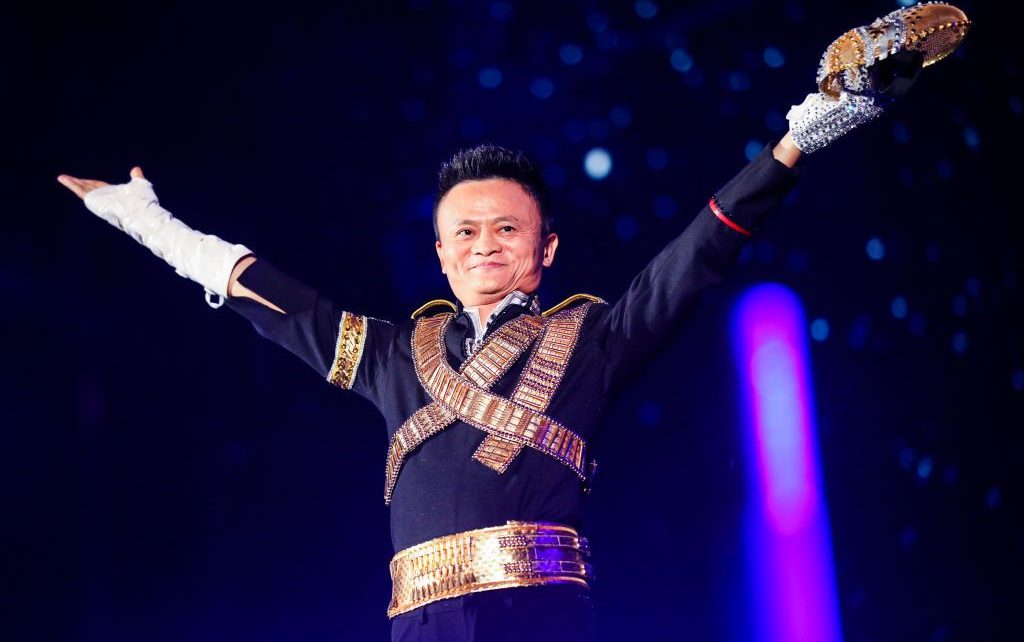In the three decades since he founded e-commerce behemoth Alibaba Group, Jack Ma has reveled in his identity as China’s most flamboyant billionaire. He has been a regular at the World Economic Forum in Davos and the Fortune Global Forum, appeared at Alibaba events dressed as a punk rocker and Michael Jackson, and even performed in a martial arts movie.
And so last week, when it became apparent that Ma had failed to turn up for a recent taping of “Africa’s Business Heroes,” a TV program he created and was known to be passionate about, analysts, investors, and the financial press began to wonder: Where is Jack?
The Financial Times was among the first to notice that showrunners for the TV program, a talent contest for entrepreneurs, had replaced Ma as a judge on the show in November shortly before filming its finale. The program has yet to air, but producers have removed Ma’s photograph from its website, and the program’s promotional material conspicuously avoids all mention of him.
Subscribe to Eastworld for weekly insight on what’s dominating business in Asia, delivered free to your inbox.
Ma’s abrupt disappearance from the TV show has drawn scrutiny because it came days after he delivered a now-infamous speech to the Bund Summit in Shanghai. In his remarks to the gathering, which included China’s most powerful financial regulators, a slew of senior central bankers, and executives from some of the nation’s largest state-owned banks, Ma bluntly derided Chinese regulators for being too risk averse, stifling innovation, and clinging to a “pawnshop” mentality in overseeing China’s financial system.
Retribution was swift. Officials summoned Ma and senior executives from Ant Group, China’s leading mobile payments platform and an Alibaba spin-off, to Beijing for questioning. Days later, Beijing vetoed Ant’s initial public offering on exchanges in Hong Kong and Shanghai—a dual listing that promised to take in $37 billion, the richest IPO listing in corporate history. The Wall Street Journal has reported that orders to call off Ant’s listing came directly from Chinese President Xi Jinping.
Ma has not been seen in public since. His disappearance is reminiscent of past instance in which Beijing has detained business executives without warning for what it sees as impropriety.
An Alibaba spokesperson told Fortune Ma couldn’t attend the taping of “Africa’s Business Heroes” because of a “schedule conflict.” Neither Alibaba nor Ant has issued any press statements about Ma’s whereabouts or regulatory filings on his status. (Ma stepped down as chairman of Alibaba Group in September 2019, but he remains the company’s largest individual shareholder with a nearly 5% stake, and he is Ant’s controlling shareholder.) The Chinese government also is keeping mum, and China’s state-owned media have made no mention of Ma’s long absence from public view.
Jeffery Halley, a senior market analyst for Asia-Pacific at Oanda, argues that “there’s no evidence that Jack Ma has been detained, and they really don’t have any reason to detain him.” Halley suggests Ma is voluntarily “choosing to keep an extremely low profile while he lets the people who work for him work with the regulators to come to an acceptable conclusion.”
Brock Silvers, chief investment officer at Kaiyuan Capital, thinks there’s more to Ma’s vanishing act. “Over decades in public life, the attention-loving Ma has never disappeared for long,” he said. “Whatever is happening now is clearly out of the ordinary. Should the Beijing authorities be behind this unusual silence, that could have a deep negative impact on Alibaba, Ant, and China’s overall tech sector.”
Whatever the reason for Ma’s absence from the public eye, his disappearance marks a significant shift in the status of China’s tech tycoon. Ma, a former school teacher who launched Alibaba with a small circle of friends from his lakeside apartment in the eastern city of Hangzhou and became, for a time, China’s richest man, was long venerated as a national hero—the personification of Chinese grit and entrepreneurial spirit and a living symbol of its rise to prosperity. But China’s communist leaders increasingly view China’s tech moguls with suspicion, fearing they have amassed too much power and cannot be counted on to support the goals of the party.

It is not uncommon for Chinese investigators to detain business executives deemed guilty of putting their own interests above those of the state.
Earlier this year, billionaire real estate tycoon Ren Zhiqiang was detained and sentenced to 18 years in prison after publicly criticizing the Communist Party’s response to the coronavirus outbreak and calling Xi a “clown.” Wu Xiaohui, the Chinese tycoon who rose to international prominence after his Anbang Insurance Group embarked on a global buying spree that included acquiring the Waldorf Astoria Hotel, was apprehended in February 2018 on fraud charges and also received an 18-year prison sentence. In 2017, Xiao Jianhua, head of the troubled Tomorrow Group, was snatched by mainland security police from the Four Seasons Hotel in Hong Kong and whisked across the border; he remains on the mainland under house arrest, helping authorities dismantle his corporate empire. Guo Guangchang, chairman of Shanghai’s Fosun International, disappeared for several days in December 2015, only to re-emerge saying, without elaboration, that he had been “assisting investigations” connected to the Chinese government’s anti-corruption campaign.
China legal expert Jerome A. Cohen argues that, in China, the rules governing criminal detention are arbitrary and opaque. Nor, he notes, are foreigners exempt. Gui Minhai, a Swedish national, was kidnapped from Thailand in the wake of allegations that his Hong Kong publishing company distributed titles that were embarrassing to Xi; he remains in mainland police custody. Two Canadians, former diplomat Michael Kovrig and businessman Michael Spavor, were detained on charges of espionage in China in 2018 after Canada arrested Huawei Technologies’ CFO in accordance with a U.S. extradition request.
In recent years, Xi has sought to strengthen Communist Party control over China’s private companies, installing more party officials inside private firms, issuing a raft of detailed guidelines reminding firms to serve the state, depriving wayward businesses of credit from state-owned banks. But detaining a business leader as celebrated as Ma would take that campaign to an entirely new level. As Silvers notes, Ma is “the most iconic figure in China’s tech landscape.”
For Xi, the risk is that leaning too hard on private investors and entrepreneurs will take a long-run toll on the growth of an already slowing Chinese economy. A recent study by the Rhodium Group and the Asia Society Policy Institute found that, since Xi came to power in 2012, the amount of capital needed to generate a unit of economic growth has nearly doubled, reflecting the growing dominance state-owned firms with lower productivity rates than private businesses.
Some analysts fear Xi’s heavy-handed treatment of private business leaders is replacing the mantra of Deng Xiaoping’s era of “opening and reform” — “To get rich is glorious!”—with a more subdued maxim: “To get rich is dangerous.”
Chinese tech founders and tech firms are going to be much more cautious now, says Paul Schulte, founder of Hong Kong-based equity research firm Schulte Research. “The first call every day of every tech company in China is just going to be the regulator. Everybody is going to go on radio silence. Nobody’s going to brag or talk at any conference about anything.”
Since Ma’s speech, the state has pressured Alibaba and Ant Group on multiple fronts. In November, the State Administration for Market Regulation warned that it was concerned by the price- and data-handling practices employed by Chinese tech giants and fined Alibaba and Tencent Holding’s e-book and TV production affiliate China Literature for their conduct in making corporate acquisitions. On Dec. 23, the SAMR announced a formal anti-trust probe of Alibaba. Since Ma’s speech in Shanghai, Alibaba’s Hong Kong-listed shares have dropped 25%; its shares on the New York Stock Exchange are down by a similar margin, 26%.
Chinese regulators also have criticized Ant for squeezing rivals from the market and disregarding consumer rights. They’ve proposed that Ant Group be restricted to its original business—mobile payments—and surrender more lucrative business in consumer lending and mutual funds. Some analysts warn that the group may be broken up entirely.
Ant is newly contrite. Chairman Eric Jing said last week, in the wake of the company’s collapsed IPO, that Ant appreciated the “guidance and help” from regulators and is “looking into the mirror, finding out our shortcomings, and conducting a body check-up.” Jing promised that Ant would “properly manage” issues related to the suspended IPO and align Ant’s actions with China’s national policy goals. Alibaba pledged to “actively cooperate” with antitrust investigators.
Halley argues that Ant Group’s IPO may never materialize. “I think the company will have to break itself up. The regulators clearly think Ant is too powerful and they think it’s too much of a single party risk to the financial system,” he said. “If you are a big tech company in China, Beijing is sending a very clear message about flying too close to the sun. They are sending a very clear message about who runs China: ‘It’s not you, it’s us.’”
For now, where all that will leave Ant’s controlling shareholder remains as much a mystery as his whereabouts.
More must-read tech coverage from Fortune:
- A brief history of Bitcoin bubbles
- Commentary: Why the U.S. needs a national climate investment fund
- The biggest conspiracy theories of 2020 (and why they won’t die)
- Why Julian Assange’s victory does little to help the cause of press freedom
- Commentary: Marketers can’t predict what you’ll buy—even if they use A.I.




